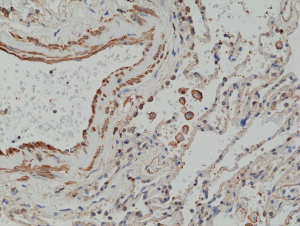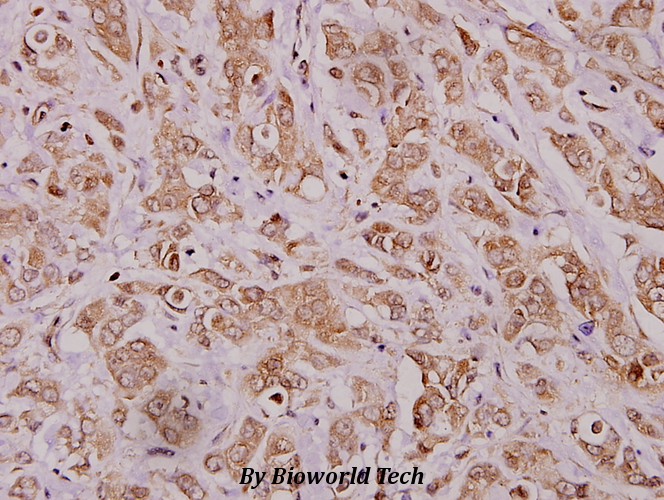
Immunohistochemical staining of formalin fixed and paraffin embedded human lung tissue section using anti-MMP-12 rabbit monoclonal antibody (Clone RM381) at a 1:2500 dilution.
anti-MMP-12 (human), Rabbit Monoclonal (RM381)
REV-31-1267-00
ApplicationsWestern Blot, ImmunoHistoChemistry
Product group Antibodies
ReactivityHuman
TargetMMP12
Overview
- SupplierRevMAb Biosciences
- Product Nameanti-MMP-12 (human), Rabbit Monoclonal (RM381)
- Delivery Days Customer2
- ApplicationsWestern Blot, ImmunoHistoChemistry
- CertificationResearch Use Only
- ClonalityMonoclonal
- Clone IDRM381
- Gene ID4321
- Target nameMMP12
- Target descriptionmatrix metallopeptidase 12
- Target synonymsHME, ME, MME, MMP-12, macrophage metalloelastase, matrix metallopeptidase 12 (macrophage elastase), matrix metalloproteinase 12 (macrophage elastase)
- HostRabbit
- IsotypeIgG
- Protein IDP39900
- Protein NameMacrophage metalloelastase
- Scientific DescriptionProteins of the matrix metalloproteinase (MMP) family are involved in the breakdown of extracellular matrix in normal physiological processes, such as embryonic development, reproduction and tissue remodeling, as well as in disease processes, such as arthritis and metastasis. Most MMPs are secreted as inactive proproteins which are activated when cleaved by extracellular proteinases. Active MMP-12 (Macrophage metalloelastase; MME; Macrophage elastase; ME) has a broad substrate range. In addition to its activity against elastin, MMP-12 has been shown to cleave human CXC-chemokines such as CXCL1, CXCL2, CXCL3, CXCL5, and CXCL8. It also degrades collagen type IV, fibronectin, laminin, vitronectin, and certain proteoglycans. Although it seems to be mainly involved in COPD, MMP-12 has also been reported to be involved in malignant progression in colorectal, nonsmall cell lung cancer, prostate cancer, hepatocarcinoma and head and neck squamous cell carcinomas. The protease MMP12 is also involved in macrophage migration and potentially could have a crucial role in regulating the resolution of inflammation, by cleaving IFNgamma, thereby rendering the cytokine unable to signal via its receptor. - Recombinant Antibody. This antibody reacts to human Matrix metalloproteinase-12 (MMP-12). Applications: WB, IHC. Source: Rabbit. Liquid. 50% Glycerol/PBS with 1% BSA and 0.09% sodium azide. Proteins of the matrix metalloproteinase (MMP) family are involved in the breakdown of extracellular matrix in normal physiological processes, such as embryonic development, reproduction and tissue remodeling, as well as in disease processes, such as arthritis and metastasis. Most MMPs are secreted as inactive proproteins which are activated when cleaved by extracellular proteinases. Active MMP-12 (Macrophage metalloelastase; MME; Macrophage elastase; ME) has a broad substrate range. In addition to its activity against elastin, MMP-12 has been shown to cleave human CXC-chemokines such as CXCL1, CXCL2, CXCL3, CXCL5, and CXCL8. It also degrades collagen type IV, fibronectin, laminin, vitronectin, and certain proteoglycans. Although it seems to be mainly involved in COPD, MMP-12 has also been reported to be involved in malignant progression in colorectal, nonsmall cell lung cancer, prostate cancer, hepatocarcinoma and head and neck squamous cell carcinomas. The protease MMP12 is also involved in macrophage migration and potentially could have a crucial role in regulating the resolution of inflammation, by cleaving IFNgamma, thereby rendering the cytokine unable to signal via its receptor.
- ReactivityHuman
- Storage Instruction-20°C,2°C to 8°C
- UNSPSC41116161








![Whole cell extract (30 μg) was separated by 10% SDS-PAGE, and the membrane was blotted with MMP12 antibody [N3C1], Internal (GTX100704) diluted at 1:1000. The HRP-conjugated anti-rabbit IgG antibody (GTX213110-01) was used to detect the primary antibody.](https://www.genetex.com/upload/website/prouct_img/normal/GTX100704/GTX100704_39995_20220520_WB_w_23060100_277.webp)